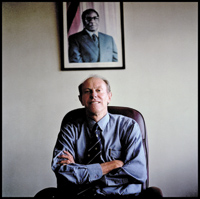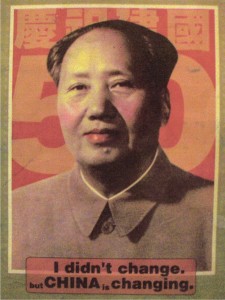 As discussed in the previous post, the question of presidential portraits has symbolic importance for some Zimbabweans. As Bev Clark wrote in 2005, framed photographs of Mugabe hang on the walls of many banks, shops, and hotels – despite there being no law requiring this. Contrast this with Cote d’Ivoire’s Laurent Gbagbo, who, soon after being elected in 2000, banned photos of himself in hotels and airports. This prompted a BBC listener forum asking if Presidential photos are a bad idea. (Gbagbo’s term expired in 2005 and yet Cote d’Ivoire has yet to hold elections fresh elections, but that’s another story.)
As discussed in the previous post, the question of presidential portraits has symbolic importance for some Zimbabweans. As Bev Clark wrote in 2005, framed photographs of Mugabe hang on the walls of many banks, shops, and hotels – despite there being no law requiring this. Contrast this with Cote d’Ivoire’s Laurent Gbagbo, who, soon after being elected in 2000, banned photos of himself in hotels and airports. This prompted a BBC listener forum asking if Presidential photos are a bad idea. (Gbagbo’s term expired in 2005 and yet Cote d’Ivoire has yet to hold elections fresh elections, but that’s another story.)
Even with the transitional, inclusive government, little has changed. In a recent interview with The Atlantic, Minister of Education, Sport and Culture David Coltart (of the Movement for Democratic Change) is depicted sitting below Mugabe’s portrait.
This week, we shared this photograph with our subscribers, with the question:
Should MDC members of the Unity Government uphold the portraits of the old Zanu PF guard? Write to us at info [at] kubatana [dot] net
We’ve been delighted with the volume – and variety – of feedback we’ve received. Read some of these responses below.
My thinking they should do away with the portraits of Mugabe
- VV
——
Yes the potrait should remain for now.
- CM
——
All portraits should be removed and never replaced.
- AC
——
I am against upholding the potraits of the old guard. If we have to then let both the Prime Minister’s and President’s potraits both be displayed.
- MD
—–
I say no, members of the unity governement should remove that portrait and replace with theirs. I am sure that portrait is now tired of hanging all these 2 decades. It simpy needs a replacement. Thats my opinion . . . as long as i will get my freedom after expression will keep on writting.
- TT
——
MDC T & M clearly seem happy to be pandering and fawning over the old guard for reasons best known to themselves that they clearly haven’t shared with the resent of us. Attending their parties, eating their food and generally showing a camaraderie that seems to be saying for them, as far as they are concerned the war is over now!
- MJN
——
I would like to put across my opinion on this matter (which you have sought opinions for from across the Kubatana family), which goes like this:
His Excellency, Comrade R. G. Mugabe is the President of the Republic of Zimbabwe. According to the agreement that ZANU (PF) signed with the 2 MDC formations, it is an agreed fact that he is also the Head of State and Commander of the Defence Forces. Now, in these 3 capacities, especially, the first 2, the portrait has every right to be put up in every important office and public place.
Maybe, the question we should be asking ourselves is, should the portrait of the Prime Minister’s be put up there as well besides that of the President (in other words, should the 2 portraits share the same space)? My humble opinion is, maybe we need to look back into history to the time when the current President was still the Prime Minister. Did we have 2 portraits? I have done a little research, and I am informed that the 2 portraits of H. E. (the late) Canaan Banana and the then Prime Minister, Comrade R. G. Mugabe were pinned together (I stand to be corrected).
It is against this backdrop, therefore, that I opine that, maybe it will be pertinent to ask whether the portrait of the Prime Minister be pinned alongside that of the President.
Zimbabwe is a multi-racial country. A beautiful country with a beautiful people! I am thrilled to notice that in front of the President’s portrait (I am referring to the photo that you have circulated to spark this debate) we have a person of a Caucasian origin. This shows that, the portrait of the President is still accepted as a symbol of state leadership by all Zimbabweans.
In a nutshell, I feel the portrait of Comrade R. G. Mugabe who is the current Head of State and President of the Republic of Zimbabwe, should stay up there! We need to pin it up where everyone will be able to see it!
Thank you for giving me time to provide my own opinion on this matter.
- JC
——
1. Unfortunately, Mugabe is still the President. It is not possible to separate the President from the old ZANU(PF) guard. (Yet.)
2. Please stop calling it a Unity Government. It’s an Inclusive Government. We know there is no “unity”. So do all the parties involved. They don’t call it a unity government. They call it an inclusive government. The only people who call it a unity government are the press and commentators. Please use the name that says what it it, not what it is not!
- RS
——
I am so worried that as a nation we are not looking for the things that can build us and brng us closer to each other. We have in the last 27 years suffered a lot being divided by a fellow African. Should we at time time keep this division.. the Zanu and MDC to an extent of killing each other as we did running up to the presidential elections re-run…
What is a picture when there are more pressing issues, the continued tortue of the opposition, abuse and victimisation of women and children for poltical expendience. I warn your platform not to play in the hands of Zanu to further divide our people.
To hell with the divisions.
- JS
——
Nope. We either need to have no portraits (unlikely) or two portraits – one for the president and one for our prime minister (yes, the pronouns are intentional).
- LL
——
Zanu are not the masters of anyone. They lost the elections fair and square. Therefore a photo of Mugabe should not be hung . Imagine if a photo of Ian Smith was still hung what would be said by all and sundry. I for one will never accept a leader who has virtually forced himself on others.
- VN
——
Yes, the portrait of a politician can not be mandatory for public places and still less for private offices. In Germany it is unbelievable that the portrait of the president would hang from every wall. Also streets and public places are never receiving names of living persons. Not one living person would ever accept such a treatment. Only extremely proud and fallacious persons can accept or even demand such acts. It shows that they are personally not self-confident. Streets and public places all over the world should never be named after politicians and military people. Often you only hear years after their death what kind of scrupulous people they were. Would Zimbabweans ever have believed before independance who has freed them from the colonialists so to grant them less freedom after independance? Education in democratic behaviour must start in the family and is continued at school. Women must play a more important role in family and society. At the top of crime statistics are always men. The woman is the future of humanity. This declaration is signed by a man.
- DK
——
They should be removed we dont want those old photos. Why should we want people’s photos anyway?
- AM
——
No, of course not! He is not a monarch – it is ridiculous. There’s a great entrepreneurial opportunity here – print the image onto dart boards!
- LM
——
The issue of the portrait that hangs in every public office (and some private ones too) is all about vanity on the part of the subject matter. Many people do mistakenly think that the hanging of that portrait is legislated for – it is not. Rather, it is an instrument of intimidation – a constant reminder of who is boss. Zimbabweans should revere the flag which will remain constant regardless of who is running the country. Portrait worship remains the preserve of some African dictatorship, China and North Korea. Never mind that it is a totally unnecessary public expense, unless it is someone’s brilliant idea to remind visiting foreignors of who exactly is the leader – yeah I think thats it!
- AM
——
I do not think its a good idea under the inclusive government to put Mugabe’s potrait in offices of the MDC government office bearers. The inclusive government according to me should be based on equal share of power.
- PT
——
The continuance of the use of Zanu PF symbols and institutions has surprisingly been tolerated by the 2 MDC formations. I am not so sure if the guys don’t attach a lot of value to it or they are busy carrying out their onerous tasks so that they can make a difference. I hope that we do not have a situation whereby they are just happy with what they have got already and that will be disastrous.
I am given to believe that some of the MDC chaps (especially those that are ‘employed’ by politics) may have self actualized quite early and may even not be keen to see the elections coming their way! I hope I am wrong about this!
Besides, I am one of those people who do not believe in portraits for individuals as this tends to create a feeling among the leadership that they are demi-gods (mugabe is a typical example as he believes or has been made to believe that he is indispensable). If you look at the way people fall over each other to wear anything that bears his image as a sign of allegiance to the party; its unfortunate. I do not believe that wearing ‘President Morgan’ t-shirts is necessarily a measure of my allegiance to him.
- GN











